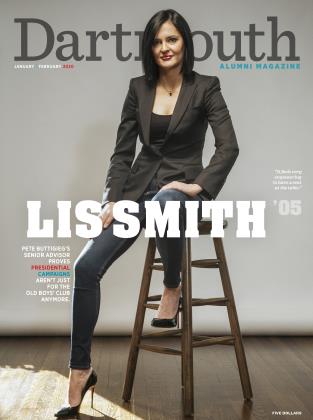Island Quest
PURSUITS
alumni books
CHRISTINA THOMPSON ’80
Sea People: The Puzzle of Polynesia
HARPER
$29.99
When the Western world first encountered Polynesia, half a millennium ago, a core mystery immediately jumped out. How did indigenous Polynesians—without writing, maps, metal tools, or modern navigation equipment such as a compass, sextant, or watch, let alone GPS—manage to occupy islands across the vast Pacific? How did they cross thousands of miles of open water to land at remote, isolated archipelagoes from Hawaii to New Zealand?
Thompson unravels the historical mystery in Sea People. Thompson, who lives in Boston and has written a memoir about her marriage to a Maori man (Come onShore and We Will Kill andEat You All, 2008), spent nearly 10 years taking deep dives into various fields, from archaeology to mythology to primitive navigation. She audited courses at Harvard. Today she knows more than most people about coral atoll formation and linguistics and rat DNA. “I love thinking about complex questions that are hard to answer,” she tells DAM, “and thinking about all the ways people have tried to answer those questions.”
Sea People exudes a familiarity with Polynesia because Thompson visited the islands. Repeatedly. “Understanding the landscape was a prerequisite,” she says. “It was partially visual, to see the islands from land, from the air, and from the sea—what was it like to be in a boat and first sight land—and partially to research in person. You have to get a firsthand feel.” Thompson, the editor of Harvard Review, has also lived in Hawaii and Australia.
Thompson sketches sympathetic but honest mini-portraits of the various explorers and scientists who came up with theories about Polynesian migration. She weighs the evidence they uncovered and the claims they made, pointing out the cultural assumptions behind them. She could have entirely dismissed certain people—adventurer Thor Heyerdahl and his KonTiki expedition, for instance, or professor Andrew Sharp and his theory of accidental voyaging (the idea that the Polynesians had more or less drifted across the Pacific)—but instead she tells their stories while at the same time firmly shredding their arguments. “People make assumptions about every era,” she says. “It is easy now to scorn people from the colonial era, for example, but each generation has its own fascinating contributions, flaws and all.”
The mystery of Polynesian migration is not fully solved, however. Despite modern technology such as radiocarbon dating, there is still more to learn. “The story always is changing,” Thompson says. “Since the book came out, there have been more discussions about the sweet potato and how it got to Polynesia from its native South America.”
EDITOR’S PICKS
MICHAEL GRODEN ’69 The Necessary Fiction: Life with James Joyce’s Ulysses Edward Everett Root
A leading Joyce scholar for four decades explains why he’s devoted so much of his life to Joyce’s Ulysses (1922). He intersperses personal tales of reading, studying, and teaching Joyce with in-depth analysis of the novel. His “autobloomography” comes in at more than 85,000 words, including a chapter-by-chapter summary of Ulysses.
NEAL KATYAL ’91 Impeach: The Case Against Donald Trump Mariner
Could Trump’s lack of accountability be the end of American democracy as we know it? Does the Ukraine scandal qualify as an impeachable offense? The celebrated U.S. Supreme Court lawyer and Georgetown professor lays out his case. “Anyone who reads this will come to the conclusion that what the president did is such a grave offense it is a structural crime against the American people,” says Katyal. Impeachment should be a last resort, he writes, but no one is above the law.
ALLISON (ABOUD) HOLZER ’OO Dare to Inspire: Sustain the Fire of Inspiration in Work and Life Da Capo Lifelong Books
The “burst of energy” that makes you feel full of ideas and potential, free of constraints? That’s inspiration, as defined by consultant Holzer and her coauthors, whose interviews with business innovators provide insights and lessons for how to “find the spark” and inspire teams, leaders, and organizations.
OMAR D. FODA ’07 Egypt’s Beer: Stella, Identity, and the Modern State University of Texas Press
Stella beer is a distinctly Egyptian brand that came to symbolize the seismic changes the country endured after the British occupation. Foda, grandson of the company’s CEO and a professor at Towson University, delivers an unusual case study of economic success—Egyptians were the first to manufacture beer—and cultural transformation, a brewing history that illuminates the evolving consumerism and epic, tumultuous transformation of a country through the last century.
Additional titles and excerpts can be found on the DAM website.
 View Full Issue
View Full Issue
More From This Issue
-
 Feature
FeatureInnocence Found
JANUARY | FEBRUARY 2020 By MICHAEL BLANDING -
 Feature
FeatureThe Fate of the Forest
JANUARY | FEBRUARY 2020 By Svati Kirsten Narula ’13 -
 Feature
FeatureReady to Roll
JANUARY | FEBRUARY 2020 By RICK BEYER ’78 -
 COVER
COVERTrail Blazer
JANUARY | FEBRUARY 2020 By C.J. Hughes ’92 -
 CLASS NOTES
CLASS NOTESDeaths
JANUARY | FEBRUARY 2020 -
 CLASS NOTES
CLASS NOTESClubs & Groups
JANUARY | FEBRUARY 2020
Books
-
 Books
Books"Anetka's Carol," the fifth of a series of six
JANUARY, 1928 -
 Books
BooksADVENTURES IN SPANISH ARCHAEOLOGY.
JUNE 1972 -
 Books
BooksREBECCA NURSE, SAINT BUT WITCH VICTIM.
April 1931 By H. B. P. -
 Books
BooksThe Diplomacy of the War of 1812
By J.F.C. -
 Books
BooksTHAT MEN MAY UNDERSTAND
May 1941 By Louis P. Benezet '99 -
 Books
BooksRUDOLPH (The Red-Nosed Reindeer).
January 1940 By Sidney C. Hayward '26







